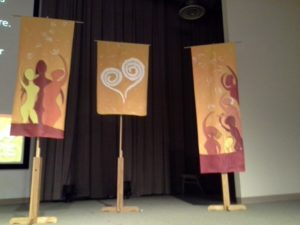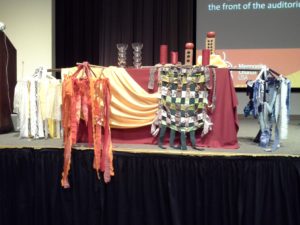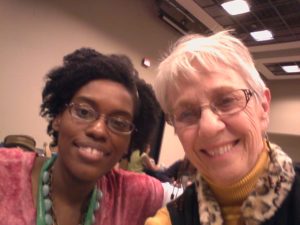By Ruth Lapp Guengerich, co-director for Mennonite Women USA
This blog post was originally shared March 17, 2014, on Mennonite Women Voices, the blog of Mennonite Women USA.
It is almost three weeks since I participated in the Women in Leadership Project (WLP) women doing theology conference at Leesburg, VA, and I continue to evaluate, reflect upon, and struggle to articulate what happened to me while at that conference. While it is difficult to put into words “what happened to me” here is an attempt at that.
Over the years I have attended Women in Ministry conferences, even though I am not an ordained minister, and have read myriads of books about women in leadership. In my younger days some people thought of me as a “radical feminist” who loudly advocated for inclusive language (in church, in the Bible, and in hymns) and equal opportunities for women.
In the late 1970’s, while living in Ann Arbor, Michigan, I participated in a 5K run, sponsored by National Organization for Women (NOW), to raise money for passage of the Equal Rights Amendment (ERA). As I ran past the Ann Arbor Farmers’ Market early on a Saturday morning, I stopped and borrowed a vendor’s black marker to write on my white jacket, “Run for ERA” so that people would know my cause.
I have not lost my zeal for the cause, but have at times felt discouraged, frustrated, and hopeless that things would truly change for women in our culture, and in our denomination. Within our MC USA we have seen women serve as college presidents and have experienced an increase of women pastors within our denomination. Yet the reality is that women’s wages are not on parity with men’s, and violence against women continues. Women are blamed for being seductive and men are let off the hook, because they cannot control their impulses.
So, you may ask, what does all this have to do with attending the conference, “All you Need is Love”? It has, in fact, everything to do with attending this conference. Planned by women, for women, with women, I felt a sense of safety, trust, acceptance, warmth, and commonality, even though we were not all in agreement about what stance to take on gender identity, sexism, racism, and even how to express our thoughts and feelings theologically.
Participation at this conference renewed my belief and trust that women of the Mennonite Church will continue to advocate for opportunities for women, to bring about more equality, acceptance, recognition for women in all parts of the church. As women find their voices in a safe space, such as at this conference, they will have courage and confidence to speak out in other settings where change can be effected.
Women at “All you Need is Love “ conference came from many different parts of the U.S., urban and rural, and represented our racial and ethnic diversity. Some are loosely connected to the Mennonite church while others are pastors, educators, or denominational leaders.
One opportunity at the conference was small discussion groups, called circle groups, where we were encouraged to first learn to know each other, and then to discuss the presentations made during the larger group sessions. My group included two of us over the age of 60 (the other one is retired; I am not, yet); a college professor, a pastor, and a young activist, who is the only African American in a small farming community and church in Nebraska.
This gift of diversity allowed us to learn from each other and to understand that each of us has different needs and perspectives. One who grew up in a matriarchal culture does not necessarily connect with the longing for leadership opportunities; another who will never have children did not connect with the “womb” metaphors – thinking of Mother God as the womb, and returning to the womb of God. Yet we heard each other and we respected our varied perspectives; our circle group was a microcosm of the larger conference demographics.
I conclude with some memorable quotes from the conference, over which I will continue to mull:
“Our love is like a womb, holding our pain/joy/hope.”
“There is a place for me within Mennonite church USA, although sometimes it is hard and painful.”
“We are not inconvenient or a mistake.”
“We need to learn how to stay, to speak up, explain how we feel, use our power to resist evil, listen, and let go/forgive (rather than remain in bondage).”
“God is she and he and more than anything we could imagine.”
“Ours is not an unrequited love.”
“There can be no love without action.”
“Healing occurs in a holding environment (womb-like safety) and involves risk, challenge and flexibility.”
“Love welcomes and transforms.”
“The best we can do is try to love.”
“We need a theology of hope, not just of suffering.”
And finally, a few questions that haunt me:
Calenthia Dowdy during the first evening, asked: “What might we as sisters give up to be in solidarity?”
Laura Brenneman responded: “What do you need to be healed? What is your holding environment like? What will healing look like?”
Julia Feder asked: “Will we follow the crucified Christ or the resurrected Christ?”
Whether another such conference will be planned in the near or distant future remains to be seen. This conference laid excellent groundwork for such a possibility.




